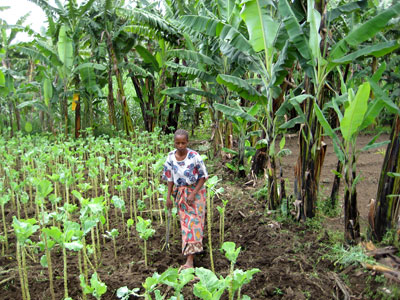Safe insecticides, algal biofuels among 2012 academic venture fund projects
By Krishna Ramanujan


Imagine an insecticide that targets only specific species, such as hungry potato beetles or mosquitoes, but with no negative environmental effects ... or mini wind turbines lining sides of buildings in an artistic array to provide "green" energy and beauty.
These are two of 10 interdisciplinary projects that have received funding through the Atkinson Center for a Sustainable Future's (ACSF) academic venture fund for spring 2012. The awards, totaling $735,000, were announced May 18.
Launched in 2008, the awards are intended to stimulate original, cross-disciplinary sustainability science research at Cornell, with an emphasis on work that may potentially spur collaborations with external partners in industry, government, foundations and nongovernmental organizations.
In this round, 90 percent of the selections included researchers from three or more departments, and 80 percent addressed two or more of ACSFs sustainability themes of energy, environment and economic development.
The projects are:
- Impacts of pathogens and pesticides on wild pollinators in eastern apple orchards: This study by researchers in entomology (ENT), population medicine and diagnostic sciences (VTPMD), plant pathology and ecology and evolutionary biology (EEB) will measure the effects of pesticides and pathogens on wild mason bees. Wild bees are key pollinators of apples, along with managed colonies of European honeybees.
- Improving energy cost and scalability of algal biofuels: Sustainable algal biofuels could help meet the world's energy needs if researchers could learn how to feasibly remove water from algae at harvest. Researchers from chemical and biomolecular engineering (CHEME), biological and environmental engineering (BEE) and physics will collaborate.
- Distributed scale biorenewable hydrogen generation: With hydrogen fuel cell vehicles on the near horizon, researchers from mechanical and aerospace engineering (MAE), the Energy Materials Center and CHEME will try to develop a biorenewable way to produce hydrogen by converting biomass to synthesis gas and then to hydrogen, as an alternative to electrolysis for commercial hydrogen production.
- Sustainable production of leafy green vegetable crops in sub-Saharan Africa: With African partners, Cornell researchers from horticulture, cooperative extension and applied economics and management (AEM) will try to develop African leafy green sukuma wiki that is resistant to black rot by crossing it with resistant cabbage. The rot can lead to more than 50 percent in market losses to small farmers.
- Links between healthy diets and healthy environments: Researchers from human ecology, nutritional sciences and horticulture will assess whether healthy eating also yields a healthy environment through waste reduction, organic agriculture, lower greenhouse gasses and nitrogen pollution, and more.
- Probing the micromechanics of shale under varying fluid compositions: This study aims to minimize environmental impacts of hydraulic fracturing by better understanding how shale fractures when drilling for natural gas and by testing new and safer fracking fluids. Researchers from earth and atmospheric sciences, materials science and engineering, MAE and civil and environmental engineering (CEE) will collaborate.
- Developing species-specific and environmentally friendly insect control: ENT and BEE scientists are working to make double-stranded RNA more stable under field conditions to interfere with gene transcription in specific insect species, thereby creating a safe, targeted insecticide.
- Assessing mycotoxin exposure in pregnant Zimbabwean women: Mycotoxins from crop molds in Zimbabwe may cause children to be stunted and malnourished, prompting researchers from nutritional sciences, plant pathology, animal sciences and VTPMD to gather data on childhood growth and mycotoxin exposure during pregnancy.
- Climate protection as a driver for job creation for New York state: Researchers from the Global Labor Institute, CEE and architecture will develop policy for a New York state climate jobs program that lowers carbon use while also putting New Yorkers to work.
- Energy harvesting from high-density, small-scale turbines in urban areas: Arrays of small wind turbines attractively mounted on the sides of buildings may bring sustainable energy to urban areas, thanks to work by investigators in MAE, CEE and architecture.
Media Contact
Get Cornell news delivered right to your inbox.
Subscribe